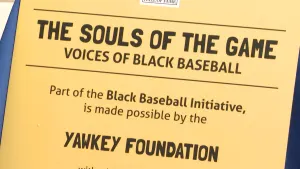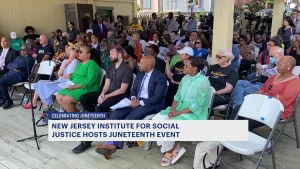More Stories
Juneteenth becoming a federal holiday has sparked a conversation about symbolism. But some say that the legislation doesn’t answer the cries for justice and racial equality.
Rallies, flags and words of healing – all to remember the 250,000 enslaved Africans who finally learned that they were free on Jun 19, 1865 – more than two years after the Emancipation Proclamation went into effect.
President Joe Biden made Juneteenth a federal holiday more than 150 years later.
“It’s about time that acknowledgment is made on behalf of African Americans who have struggled in this country from its inception,” says Gilda Rogers, co-chair of the T. Thomas Fortune Foundation.
Rogers calls the new federal law significant. But she and others say that the holiday isn’t the justice that they have marched, cried and bled for.
“We asked for reparations. We asked for freedom. We asked for peace. We asked for us to be accepted for who we are as Black people and brown people,” says Black Lives Matter Elizabeth chapter leader Kason Little.
Little calls the move nothing more than a symbol.
“They want to celebrate Juneteenth being a national holiday. But we’re still not teaching our children the raw aggregate history in schools. They are still being told that Christopher Columbus discovered America, not indigenous people. They’re not being taught about what happened in Tulsa, Oklahoma,” Little says.
"I think if you commemorate Juneteenth without understanding the ongoing work associated with Juneteenth, then I think you celebrate too soon,” says New Jersey Institute for Social Justice head Ryan Haygood.
Haygood says that truly commemorating the end of slavery starts with repairing the racial disparities it has left behind, especially in New Jersey.
“The individual net wealth for Black adults is a staggering $179,” says Haygood.
Haygood says that in order to address systematic inequalities, a reparations task force is necessary.
“Beginning to make people whole who provided the free labor upon which this country’s wealth is based and upon which our white brothers and sisters have disproportionally seen advantages,” he says.
The activists are looking for local leaders to take more action.
“We need ultimately our representatives to legislate on a mandate in full defense of us, not just the talk. But we need them to walk that walk as well,” says Little.
"We have to have a seat at the table. Like Shirley Chisholm said, ‘If they don't give you a seat at the table, bring a folding chair,’” says Rogers
Rogers says that she is optimistic that change is possible.
More from News 12
0:40

Hundreds attend Juneteenth celebration at Liberty State Park
2:46

‘People have worked so hard.’ Woman who helped make Juneteenth a national holiday visits New Jersey
1:57

‘Unity in the community.’ Juneteenth Festival celebrated along Bergen Street in Newark
1:01

‘It means freedom.’ Piscataway Library hosts ‘Grandmother of Juneteenth’ Dr. Opal Lee
2:38

Baseball Hall of Fame to feature new exhibit to honor the Negro League
1:05
